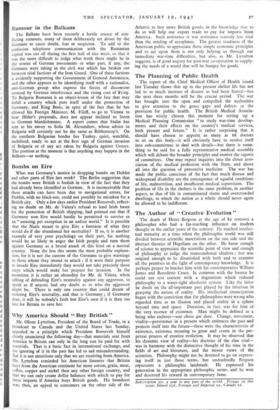The Author of " Creative Evolution "
The death of Henri Bergson at the age of 82 removes a philosopher who had a far-reaching influence on modern thought in the earlier years of the century. He reached intellec- tual maturity at a time when the philosophic world was still divided between scientific materialism on the one side and the abstract theories of Hegelians on the other. He knew enough of science to appreciate the scientific point of view and enough of philosophy to judge the transcendental idealists ; but was original enough to be dissatisfied with both and to examine all the premises in the light of contemporary knowledge. It is perhaps proper to bracket him with his contemporaries William James and Benedetto Croce. In common with the former he could not rest content with a dogmatism which reduced philosophy to a water-tight absolutist system. Like the latter he dwelt on the all-important part played by the intuition in grasping the nature of reality. His intellectual emancipation began with the conviction that the philosophers were wrong who regarded time as an illusion and placed reality in a sphere beyond time and space. Duration, in fact, was for him of the very essence of existence. Man might be defined as a being who endures—une chose qui dure. Change, movement, vitality—persistence in a present which embraces the past and projects itself into the future—these were the characteristics of existence, existence meaning to grow and create in the per- petual process of creative evolution. It may be observed that his dynamic view of reality—his doctrine of the élan vital— was in harmony with the distinctive thought of his time in the fields of art and literature, and the newer views of the scientists. Philosophy might not be destined to go on express- ing itself in just those terms, but undoubtedly Bergson represents a philosophic landmark. He expressed his generation in the appropriate philosophic terms, and he won and deserved his reward in contemporary fame.


























 Previous page
Previous page